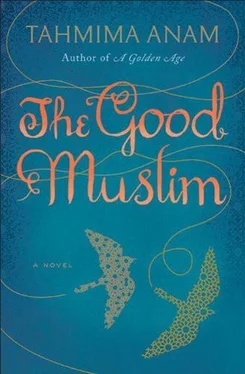*
Maya was reluctant to leave the house. In the morning she jogged around the lake, and sometimes, when Ammoo asked, she walked over to the shop at the top of the road and bought a few things. She had written three letters to Nazia, pleading with her to stay in touch, offering to send money if she needed anything. She had tried to ring once, at the post office in town, leaving a message, saying she would ring back three days later at exactly the same hour. Three days later the man at the post office said he had spread the word, but no one had come to receive her telephone call.
She rang again the following week. The man was polite. He didn’t know if Nazia had returned from the hospital. Maya remembered him: he was the one who had delivered her telegram.
‘Are you well?’ she asked him.
‘Yes, apa, but my daughter is ill.’
Why did this give her pleasure? Was it that the villagers would get sick, now that she was not there to look after them? ‘Will you tell her I rang?’ she said, skipping over the catch in her voice.
‘I will tell her, apa.’
‘Thank you.’
‘The joldugi will be sweet this year, apa.’
She would miss the pineapples, he was saying, and perhaps they would miss her.
*
‘Zaid, I’m going to the vegetable man. Do you want to come?’
‘Wait,’ he said, holding up his hand. He bounded up the stairs, returning a few minutes later with a crumpled piece of paper.
Maya took it from him. ‘Let me see that.’
A shopping list from upstairs.
Okra, it said. Potatoes. One gourd.
They set off down the road. ‘Where are your shoes?’
He shrugged. ‘Dunno.’ Skipping lightly over the hot road. She steered him towards the shade. Turning a corner, they came upon a large building with open windows.
Two twos are four, three twos are six, four twos are eight.
Zaid, holding the shopping note, stood frozen.
The name on the gate said AHSANULLAH MEMORIAL BOYS’ SCHOOL.
‘You’ve seen it before?’ she said, turning to ask him, but he had disappeared. A moment later he was the other side of the gate, peering into the window. He pulled the cap from his head.
‘Someone will see you,’ she called out as he worked his way around the building. ‘Come back.’
He ducked out of sight. She waited five, ten minutes. She heard a whistle and followed it, turned a corner and found him waiting for her. He had scaled the high wall at the back of the school building and dropped into the street; his kurta was streaked with orange-brown dust. He pulled the cap from under his arm, planted it back on his head. ‘Come on,’ he said, ‘we’ll be late.’
The vegetable man measured out the okra and potatoes, then fetched the gourd. He didn’t request any money; the upstairs people paid on account. ‘Ask the Huzoor to pray for me,’ he said.
On Independence Day, Maya switched on the television and saw the Dictator laying wreaths at Shaheed Minar, the Martyrs’ Memorial. He had a small dark head and wide shoulders fringed by military decorations. Last month he had tried to change the name of the country to the Islamic Republic of Bangladesh. And before that, he had bought a pair of matching Rolls-Royces, one for himself, another for his mistress.
Now, on the anniversary of the day the Pakistan Army ran its tanks over Dhaka, he was making a speech about the war. Eager to befriend the old enemy, he said nothing about the killings. He praised the importance of regional unity. All Muslims are Brothers, he repeated. She couldn’t bear to listen. She switched off the television and found her mother in the kitchen, frying parathas. Sufia was lifting up discs of dough and patting them tenderly between butter-lined hands.
At dusk, Maya walked from Elephant Road to Shaheed Minar in her bare feet. She stepped on newspapers and plastic bags, feeling the rough grit of sand moving pleasantly between her toes, the warmth of the tarmac slowing her down until she was barely moving, tiptoeing her way forward. A light breeze caught her under the chin, and she held the straps of her shoes between her fingers and nodded, smiling, to the small groups of people on the road beside her.
All through the movement, they had walked barefoot from Elephant Road to Shaheed Minar in red-and-white saris, greeting one another with the national salutation, Joy Bangla. Victory to Bengal .
There were only a handful of people on the road today, making their slow way through the traffic. Horns blared impatiently behind them. On the corner of Zia Sarani, Maya sidestepped a broken bottle and considered putting on her sandals. The thought irritated her. They should have closed the roads and cleaned the pavements, and there should have been a bigger crowd, thousands of people carrying children on their backs, grasping at the retreating feeling of having once, many years ago, done something of significance.
She caught the eye of a long-haired man in a woollen shawl. The man shook his head, as though he knew what she was thinking, telling her not to mind so much.
She wouldn’t be consoled. She cradled her anger, tightening her hands around the clutch of flowers she had plucked from the garden. Why hadn’t Ammoo come, and Sohail? Why, when they had lived every moment of that time together, was she here alone, between the dark blue sky and a street full of rubbish?
The memorial was illuminated by candles. The wide steps led up to three narrow concrete structures, each rising up, then bending forward, as if to provide shelter for the visitors. An enormous paper sun, painted red, was suspended from behind. The wind picked up, bending the tiny candle flames, pushing the willow tree until its leaves shook and fell forward.
Shaheed Minar was the first thing the Pakistan Army destroyed in the war. It was also the first thing to be rebuilt, taller and wider, but Maya wished they had left it broken, because now, shiny and freshly painted, it bore no signs of the struggle.
She sat down on the top step, the flowers in her lap, and watched while people made their offerings. Kneeling in front of the pillars, heads bowed. No one spoke. She saw a man weeping quietly in a corner of the arch. He brought his hand to his cheek, wiping roughly. Then he turned and looked directly at her. He stood for a moment, leaning his head forward as if to make her out in the dying light. She rose, the flowers dropping from her lap. He was beside her in an instant.
‘Maya.’
‘Joy — is that you?’
He picked up the flowers and held them out to her, and she was jolted by the memory of him, now almost a decade old. Joy. Younger brother of Sohail’s best friend. He had spent most of the war at the bungalow, an errand boy for the guerrillas, ferrying supplies back and forth from the border. He had lost a brother, a father and a piece of his right hand to the war. And he had given her a nickname once; she tried to remember it now.
They looked at each other for a long time. He was taller than she remembered. He moved towards her and, without knowing it, she took a step back. ‘I thought you were in America,’ she said, recalling the last time they had met, when he told her he was moving to New York. She had taken it personally, his abandoning the country so soon after its birth.
‘I was.’
‘But now you’re here.’
‘I’m back. Almost a year now. And you? The grapevine told me you were somewhere in the north.’
‘I’m back too.’ She didn’t know how else to explain the long way she had come.
‘And how is Sohail?’ His face was dark in the half-light of the candles, red in the shadow of the red sun behind Shaheed Minar, but she could see his broad forehead, the angle of his jaw.
‘His wife died,’ Maya said.
Читать дальше












